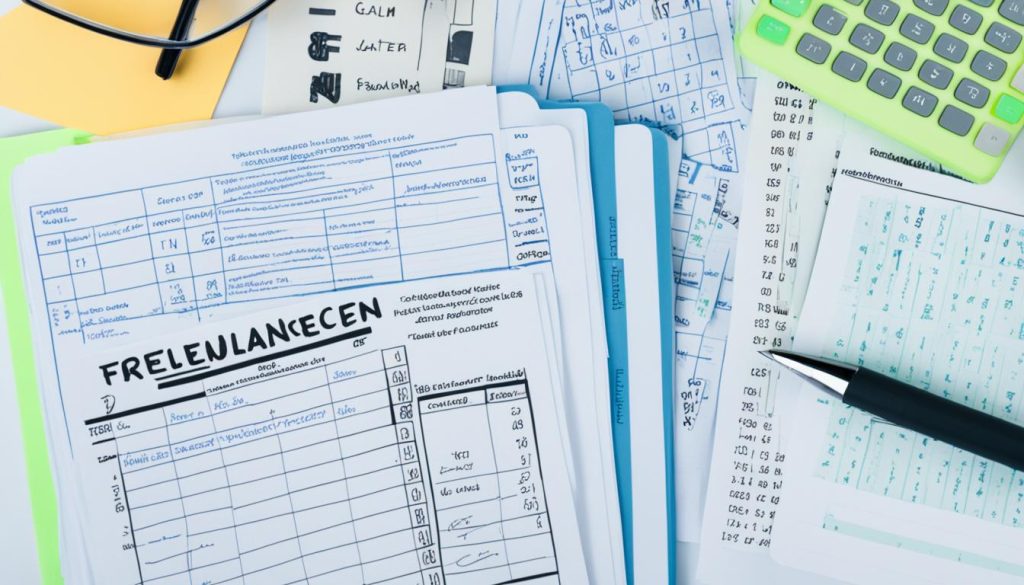Starting a freelance career is thrilling but also requires careful financial planning. You need to understand the financial side of freelancing, manage your money well, follow tax rules, and save for the future. This guide will give you the key tips to get ready for freelancing and secure your finances.
Key Takeaways
- Understand the financial implications of freelancing, including tax obligations and income fluctuations.
- Develop a comprehensive business plan to ensure financial sustainability.
- Implement effective cash flow management techniques, such as invoicing strategies and payment terms negotiation.
- Establish an emergency fund and plan for retirement to build financial resilience.
- Utilize tax-saving strategies and accounting software to streamline your financial management.
- Freelance retirement savings
- Freelance payment terms negotiation
Understanding the Financial Aspects of Freelancing
As a freelancer, you’ll need to get familiar with the financial aspects of self-employment. This means knowing about taxes, managing your income, and saving for retirement1. You should set aside 30% of your income for taxes and use business deductions to lower your taxes1. It’s also smart to save three months’ expenses for emergencies to handle income changes1.
Choosing the right business structure, like being a sole proprietor, LLC, or corporation, affects your taxes and liability2. You should figure out if you’re an employee or independent contractor to know how to handle taxes and benefits.
Planning Your Freelance Business Finances
Creating a detailed business plan is key to your freelance success3. It helps you predict your income, manage costs, and stick to your financial goals3. Having a plan for risks, like unexpected costs or changes in work, is also important.
3 Using accounting software like Accounting Seed can make managing your finances easier, with tools for bank reconciliation and ACH payments3. This automation lets you focus more on growing your business.
Managing Your Cash Flow as a Freelancer
Good cash flow management is vital for a freelancer’s success3. A detailed budget helps you keep track of your money, ensuring you don’t spend more than you make3. Using smart invoicing and negotiating payment terms can also improve your cash flow and reduce late payments.
3 Offering different payment options, like ACH or credit card, makes paying easier for clients1. With good planning and execution, you can keep a healthy cash flow. This lets you cover expenses, save for the future, and invest in your business.
Understanding the Financial Aspects of Freelancing
Starting your freelance journey means understanding the financial side of things. The choices you make affect your taxes, paperwork, and how you manage money4.
Deciding on a Business Structure
Choosing the right business structure is a key step. Many freelancers go with a sole proprietorship, using their own name4. But, some might prefer a limited liability company (LLC) for extra protection4. Getting advice can help you pick the best structure for your freelance work.
Determining Your Worker Status: Employee or Contractor
Figuring out if you’re an independent contractor or an employee is crucial. As a contractor, you handle your taxes, including self-employment tax at about 15.3% of your earnings4. You also need to make quarterly tax payments if you owe more than $1,000 a year4. Keeping detailed records of your expenses helps you claim deductions and lower your taxes4. For tricky tax situations, many freelancers hire tax consultants or accountants4.
Knowing the financial side of freelancing is key to success. Making smart choices and getting advice can help your business grow and stay stable4.
Planning Your Freelance Business Finances
As a freelancer, making a detailed business plan is key to staying financially stable. This plan should cover your financial goals, how much you expect to earn, and how to stay stable. It’s also important to have a plan for risks like unexpected costs, clients not paying, or changes in the market. This way, you can be ready for anything and keep your freelance business strong.
Developing a Business Plan for Financial Sustainability
Your business plan should have clear financial forecasts, like what you expect to earn and spend each month. This helps set achievable financial goals and spot any cash flow problems early. According to the freelancermap 2024 study, 38% of freelancers mention fluctuating income as one of the major challenges they face.5 By planning for these ups and downs, you can manage your money better and stay financially stable.
Include budgeting and forecasting in your plan to understand your income and costs. Freelancers need to manage both personal and business expenses for stability.6 This helps you make smart choices about pricing, how to use your resources, and where to invest.
Creating a Risk Management Plan
It’s crucial to think ahead and plan for financial risks as a freelancer. Freelancers don’t have a steady income like regular employees.6 Think about things like clients not paying, sudden costs, or market changes, and have plans to lessen their effects.
According to the freelancermap 2024 study, 29% of freelancers see late payments as a big problem.5 To fix this, use strong invoicing methods and talk about payment terms with your clients. It’s smart for freelancers to save 10% – 30% of their income for taxes.5 Also, having an emergency fund can help you get through tough times.
Using financial tools and software can also help manage risks. Apps like Bonsai or Freshbooks can automate things like financial reports, invoices, and accounting for freelancers.5 This lets you focus more on your work and keep your finances in check.
Financial planning and risk management don’t stop after you start. They need ongoing attention and updates as your business grows. Keeping up with planning, reviewing, and adjusting is key for good freelance budgeting.6 By tackling financial challenges early, you can set your freelance business up for success and stability567.
Managing Your Cash Flow as a Freelancer
Keeping a healthy cash flow is key for your freelance business’s financial health. Freelancers often deal with late payments, irregular income, and unexpected costs8. To handle these ups and downs, it’s vital to use smart invoicing, negotiate better payment terms, and plan your budget and income well.
Invoicing Strategies and Payment Terms Negotiation
Clear payment terms and late fees can ensure you get paid on time8. Using automated invoicing can make things smoother and lower the chance of delays. Also, try to negotiate terms like shorter cycles or upfront payments to boost your cash flow and lessen the effect of late payments9.
Budgeting and Income Planning for Freelancers
Creating a detailed budget and planning your income helps you manage your spending and allocate resources wisely9. Having a variety of clients can make your income more stable8. It’s also crucial to have some savings for the unpredictable nature of freelancing9. Learning new skills and staying updated with trends can increase your demand and success, improving your cash flow8.
Planning for busy seasons and saving for slow ones can help you handle the cash flow changes freelancers face8. Keeping an eye on your finances, like checking payments and upcoming bills, is key to managing cash flow well10. Automating payments can also affect your cash flow, so be careful with timing10.
Managing cash flow means cutting unnecessary costs and focusing on what’s really important for your business9. Having emergency funds can cover you during tough times10. Understanding your taxes and planning for them is also vital to avoid unexpected financial issues10.
By using these strategies, you can better handle the cash flow challenges freelancers often face and keep your business financially stable8.
Over 70% of freelancers struggle with getting paid on time during their careers8. Having a variety of clients can make your income more stable8. It’s important to have savings for the ups and downs of freelancing8. Learning new skills and keeping up with trends can lead to more demand and success, improving your cash flow8. Planning for busy and slow periods can help you manage your cash flow better9. The main goal is to keep more money coming in than going out9. Freelancers often face issues like late payments, changing income, and not having enough cash9. It’s wise for freelancers to save enough for three to six months of expenses9. Keeping different expenses in separate accounts can help you see your cash flow better9. Tracking your cash flow and using past data can help you predict future cash flow9. Cutting unnecessary expenses and focusing on what’s essential is key to managing cash flow well10. Freelancers may have irregular income due to their work’s nature, with varying amounts each month10. Late payments from clients can affect your cash flow10. PayPal transfers can take a few days to show up in your account, impacting your cash10. Banks might only credit a check right away, holding the rest for another day, affecting your cash10. Some banks might prioritize debits over credits, which can increase overdraft fees10. Automating payments can impact your cash flow, so timing is important10. Discrepancies in automatic payments and income can cause cash flow issues10. Regularly checking your finances is crucial for managing cash flow well10. Saving money for emergencies or slow months can help freelancers during tough times10. Planning for taxes and understanding your tax obligations is key to avoiding financial surprises10. Regularly reviewing expenses and cutting unnecessary costs can help freelancers adjust their spending during cash flow challenges.
How to Financially Prepare for Freelancing
Switching to freelancing means you need to get your finances in order. Start by looking at your current money situation. Then, set clear income goals, build an emergency fund, and plan for retirement and other big goals. These steps will help you smoothly move into freelancing and build a strong base for your career.
First, check where you stand financially. Know your monthly bills, debts, and savings or investments11. Freelancers usually earn about $20 an hour, which is like $40,000 a year11. But, you’ll pay income and self-employment taxes, so remember that in your plans11.
Then, set clear income goals for your freelance work. Think about your field, skills, and who you want to work for12. Freelancing can mean ups and downs in income, so plan for that12. Try to work with different clients to avoid depending too much on one12.
It’s key to have an emergency fund as a freelancer13. With many Americans having no emergency savings13, aim to save 3-6 months of expenses for emergencies or income gaps13. This fund helps you handle any changes in your freelance income.
Finally, plan for your long-term goals, like retirement13. Freelancers control their earnings and spending, so saving and investing is crucial13. By saving and investing wisely, you can work towards financial freedom and control over your business and life13.
Getting ready financially for freelancing might seem tough, but these steps will help you succeed. They ensure a smooth move to this fulfilling career111213.
Tax Preparation and Compliance for Freelancers
As a freelancer, it’s key to know and handle your taxes well for your financial health. This means registering your business, making estimated tax payments, and using freelance tax deductions. Learning about taxes for freelancers, like self-employment taxes and quarterly filings, can prevent big penalties and keep you in line with laws.
Understanding Taxation for Your Freelance Business
You, as a freelancer, must pay both parts of Social Security and Medicare taxes, known as self-employment taxes. The Social Security tax is 12.4% on earnings up to $142,800 in 202114. Medicare tax is 2.9% on all earnings, plus an extra 0.9% if your income is over $200,000 for single people or $250,000 for couples14.
There are tax deductions for freelancers to lower their taxes. These include the home office deduction14, equipment and supply costs14, internet and phone bills14, marketing and ads14, and professional fees14.
Freelancers must also make quarterly tax payments to the IRS based on their income, deductions, and credits14. Planning for these payments helps avoid penalties and stay in line with tax laws.
Freelancers might get tax credits like the Earned Income Tax Credit (EITC), Child and Dependent Care Credit, and Lifetime Learning Credit14. These credits can lower your taxes even more.
To file taxes right, freelancers should know about IRS forms like Form 1099-NEC, Form 1099-K, Schedule C, Form 1040, and Form 8995 for deductions14.
Getting advice from a tax expert can offer great insights and ways to improve your tax handling15. By understanding taxes and planning well, freelancers can meet their tax duties and get the most from their earnings.
“Proper tax planning and compliance are essential for freelancers to maintain financial stability and growth. Seeking professional guidance can make a significant difference in navigating the complexities of the tax system.” – Jane Doe, Freelance Tax Consultant
Building Financial Resilience as a Freelancer
As a freelancer, it’s key to build financial resilience for long-term stability. This means focusing on two main areas: saving for emergencies and planning for retirement. These steps help you stay financially strong and ready for any challenges in your freelance career.
Establishing an Emergency Fund
An emergency fund is vital for freelancers. It helps cover unexpected costs like medical bills or equipment repairs16. With 63% of freelancers facing delayed contracts and 53% seeing contracts canceled, having an emergency fund is crucial16. Experts suggest saving three to six months’ expenses17.
Automating savings to a separate account helps you keep adding to your emergency fund17. Using high-interest savings accounts can also grow your fund faster17.
Retirement Savings for Freelancers
16 About 68% of freelancers worry about saving for retirement, showing the importance of planning16. Freelancers can take charge of their future by looking into retirement savings like solo 401(k)s or Roth IRAs17. It’s important to understand how to manage risks and diversify your investments for a stable retirement17.
Creating an emergency fund and a retirement plan helps you stay financially resilient as a freelancer18. This means being able to bounce back from financial setbacks. Having various income sources and insurance is key for freelancers, especially those supporting families18.
Building financial resilience takes discipline and planning. Always be ready to adjust your strategies for long-term success as a freelancer161718.
Conclusion
Financial preparation is key when moving to a freelance career. Knowing about things like Moon Invoice’s free estimate and invoice software with 66+ designs19 helps. It shows you can earn more than regular employees worldwide19. Yet, managing your money differently since you don’t have a steady job20 is important for your future.
Success in freelancing means planning ahead, managing well, and always learning more about money. You should have a business plan for steady money, a plan for risks, and think about retirement early20. This helps you stay secure and stable over time.
Using smart strategies like saving 5-10% of your income19 and building a strong network for better jobs21 helps a lot. Also, check and update your financial plans often to match your changing needs and goals21. These steps will lead you to a rewarding freelance life. Follow these tips, and you’ll handle freelancing’s money side with ease and success.
FAQ
What are the key considerations when choosing a business structure for freelancing?
How do I determine if I’ll be classified as an independent contractor or an employee as a freelancer?
What should I include in a comprehensive business plan to financially prepare for freelancing?
How can I implement effective invoicing strategies and negotiate favorable payment terms as a freelancer?
How do I financially prepare for the transition from traditional employment to freelancing?
What are the key tax considerations and requirements for freelancers?
How can I build financial resilience as a freelancer?
Source Links
- ‘How Can I Be Financially Secure As a Freelancer?’
- The Freelancer’s Guide to Financial Management: Tips and Tools for Success | Grantford Financial Aid Blog
- How To Organize Your Finances as a Freelancer – Accounting Seed
- Managing Personal Finances, Taxes and Savings as a Freelancer
- How To Create A Financial Plan For Freelancers: Tips & Tricks
- How to Budget as a Freelancer: 6 Steps Guide
- How to budget as a freelancer
- Managing Cash Flow as a Freelancer: How Go-Getter Freelancers Stay in the Green | Moxie
- Mastering Cash Flow Management: A Freelancer’s Guide to Financial Stability – Twine Blog
- Managing Cash Flow as a Freelancer
- Year-Round Financial Planning Tips For Freelancers
- How To Find Financial Stability As A Freelancer | Maverick Words
- Financial Independence For Freelancers – Double Your Freelancing
- How to Manage Freelance Taxes: Your Guide | Expensify
- Mastering Tax Preparation for Freelancers: 5 Essential Steps
- 10 Best Financial Planning Habits for Freelancers and Entrepreneurs
- Creating a Financial Safety Net for Freelancers | AppMaster
- Four ways to build up your financial resilience – Money Talk
- 8 Mindblowing Hacks to Manage Finances as a Freelancer in 2024
- The Importance of Financial Planning for Freelancers
- How to build financial security as a freelancer?



